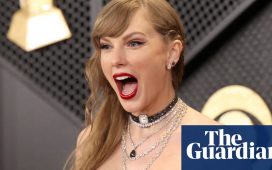As they rode through the streets of Coventry on horseback, 14 local women channelled the same spirit of social justice as Lady Godiva supposedly did on those streets about 900 years ago – only this time they did it fully clothed.
These modern-day Godivas, following in the footsteps of the woman who legend says rode naked through the city to force her husband to lower taxes, have created a new manifesto for Coventry which they presented to the elected women of the city.
They are part of a celebration to kick off Coventry’s year as city of culture which was due to start in January but the launch date was pushed back due to Covid, and even now events are still hindered by restrictions.
“Nobody would have planned an event this way if it hadn’t been for a pandemic, but it means that you find new ways of doing things,” said Justine Themen, creative director of Saturday’s daylong, city-wide Coventry Moves event. After going through a number of iterations, it was eventually broken down into a series of smaller pop-up events around the city, all of which were livestreamed for people to watch from home.
In the morning a cavalcade of 20 vehicles built in Coventry, from vintage to modern, electric cars, crossed the city, pausing for dancers to burst out and perform Irish, ska and Bollywood dance sequences in a carnival atmosphere. Later in the day, a similar procession of bikes celebrated the city’s history as a major bicycle manufacturer.
In the evening separate streams of a new piece of music created by composer Dan Jones, that uses Coventry children’s voices, were broadcast on nine local radio stations, with people encouraged to create their own surround sound experience by tuning in to different devices at the same time.

Despite the restrictions, people are still optimistic about what the year-long programme of events will bring to the city, as well as to the hard-hit cultural sector. In addition to a wide range of art and music events, later in the year the Herbert Art Gallery & Museum will host the Turner prize, and the International Booker prize will also be announced from the city.
“We have to adjust our expectations to the times that we live in,” said Pauline Black, lead singer of two-tone band The Selecter, which formed in Coventry in 1979. “Yes, it would have been fantastic to have performed in front of thousands of people, but I think over time, if people engage with the live stream, we will do exactly that just in a slightly different way. The fact that we have done it at all, I think is rather wonderful.” Black started off proceedings on Saturday singing a song about the city’s hidden river which has been covered over by development.
“I’ve been promoting Coventry on the international stage now for about 40 years. So I’m very proud that we’ve risen to the occasion of putting on this event in the best way that we can, given the circumstances,” she said.
“There’s nobody else in the country, perhaps in the world, putting on an event of this scale at this time, because it almost feels an impossibility,” said Themen, adding that she hopes the city leads the way in urban and cultural regeneration post-Covid, as it did after heavy bombing in the second world war. “I try to think of it as an opportunity, as we come out of this very difficult time, to think about how we want to make our city a better place to live in.”
Coventry-born artist and designer Daniel Lismore built an extravagant yellow and gold outfit for his part in Saturday’s event to represent the city’s innovative history.
“It makes me feel really proud to be from here. There’s many people from Coventry who have denied they were from here. I’ve never denied it,” he said. “I think this is going to be a great thing for its future, like it has done in Hull [city of culture in 2017]. And especially right now we need art. We need culture.”
The event was a beacon of light for the arts sector which has been decimated by Covid, he said, and will remind people just how beneficial the arts can be for mental health. “I think there’s hope for the future now. This is the city that comes from the ashes, after all.”








